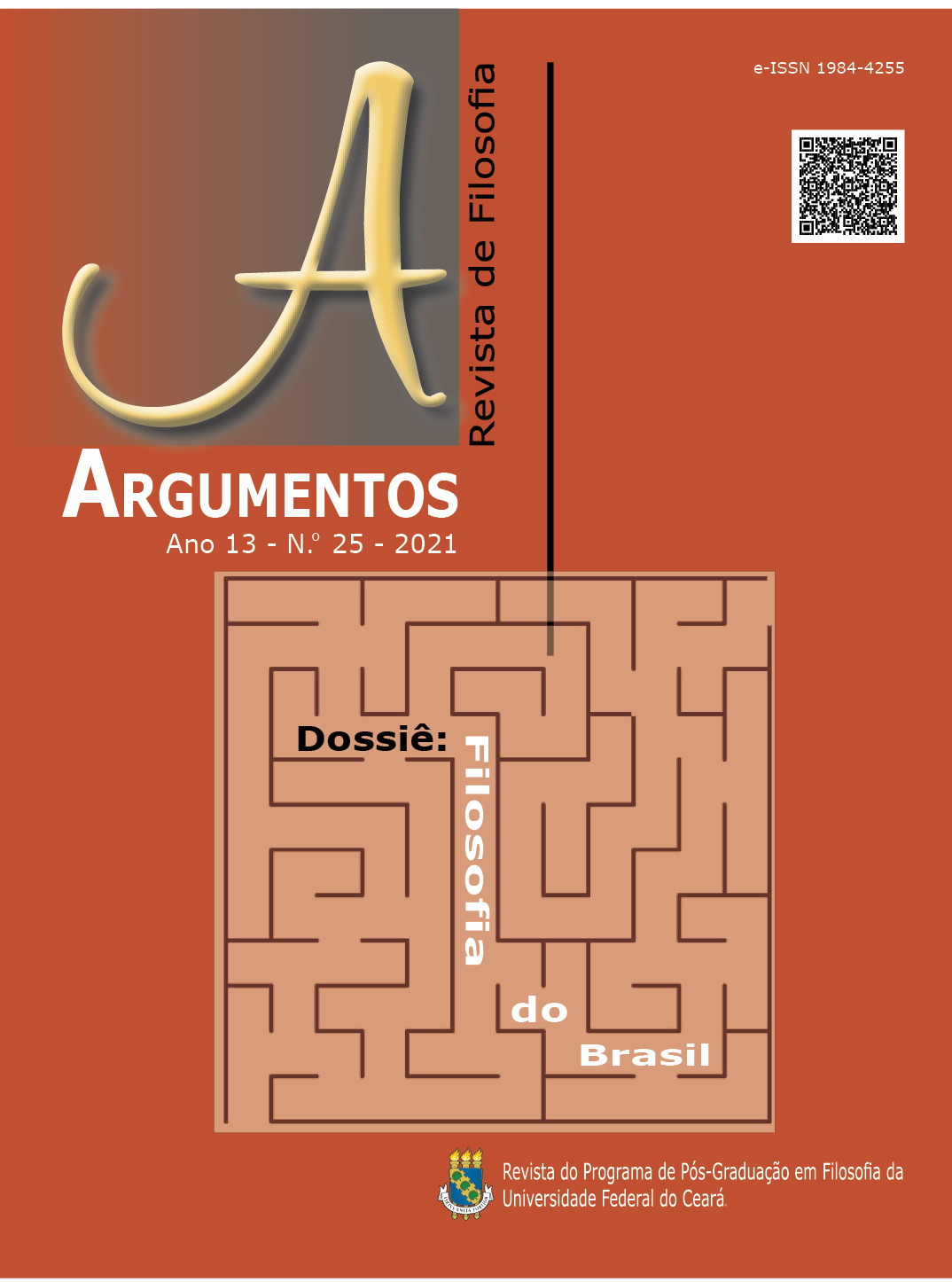Father Vaz on my philosophical path
DOI:
https://doi.org/10.36517/Argumentos.25.11Keywords:
Father Vaz. Philosophy. Formation. Friendship.Abstract
The text is a testimony about the role played by Father Vaz in my philosophical formation and in a large part of my intellectual production, both because of the friendship established in the years of companionship as Jesuits, and due to the frequent attendance of his texts until today. Remembrance is also a gesture of gratitude to the incomparable philosopher, teacher and friend.
References
LIMA VAZ, H. C. de. Escritos de Filosofia II. Ética e Cultura. São Paulo: Edições Loyola, 1988.
LIMA VAZ, H. C. de. Democracia e dignidade humana. Síntese Nova Fase, n. 44, 1988a. p. 11-25.
LIMA VAZ, H. C. de. Um novo Platão? Síntese Nova Fase, n. 50, 1990. p. 101-113.
LIMA VAZ, H. C. de. Morte e vida da filosofia. Síntese Nova Fase, n. 56, 1991a. p. 677-691.
LIMA VAZ, H. C. de. Antropologia filosófica I, São Paulo: Loyola, 1991.
LIMA VAZ, H. C. de. Antropologia filosófica II, São Paulo: Loyola, 1992.
LIMA VAZ, H. C. de. Ética e justiça: filosofia do agir humano. Síntese Nova Fase, n. 75, 1996. p. 437-454.
LIMA VAZ, H. C. de. Escritos de filosofia IV. Introdução à ética filosófica 1. São Paulo: Loyola, 1999.
LIMA VAZ, H. C. de. Escritos de filosofia V. Introdução à ética filosófica 2. São Paulo: Loyola, 2000.
LIMA VAZ, H. C. de. Contemplação e dialética nos diálogos platônicos. Trad. Juvenal Savian Filho, São Paulo: Loyola, 2012.
MIGLIORI, M. L’uomo fra piacere, intelligenza e Bene. Commentario storico-filosofico al “Filebo” di Platone. Milano: Vita e Pensiero, 1993.
OLIVEIRA, C. M. R. de. Metafísica e ética. A filosofia da pessoa em Lima Vaz como resposta ao niilismo contemporâneo. São Paulo: Loyola, 2013.
PERINE, M. Ética e sociedade. Razão teórica versus razão técnica. Síntese Revista de Filosofia, n. 93, 2002a. p. 49-69.
PERINE, M. Democracia e filosofia do agir humano. Observações sob uma luminosidade que permite a visão. In: ______. MAC DOWELL, J. A. (Org.). Saber filosófico, história e transcendência. Homenagem ao Pe. Henrique Cláudio de Lima Vaz, SJ, em seu 80o aniversário. São Paulo: Loyola, 2002. p. 317-332.
PERINE, M. (Org.). Diálogos com a cultura contemporânea. Homenagem ao Pe. Henrique C. de Lima Vaz, SJ. São Paulo: Loyola, 2003.
PERINE, M. A ética e a crise da modernidade. Uma leitura a partir da obra de Henrique C. de Lima Vaz. Cadernos IHU Ideias, v. 88, 2007. p. 1-22.
PERINE, M. Um Platão no caminho filosófico de Lima Vaz. Síntese Revista de Filosofia, n. 123, 2012. p. 9-29.
PERINE, M. Filosofia e violência. Sentido e intenção da filosofia de Éric Weil. São Paulo: Loyola, 1987 (2a edição 2013).
PERINE, M. O conceito de democracia em Henrique Cláudio de Lima Vaz e Norberto Bobbio: desafios para a ação. Em: TOSI, G. (Org.). Norberto Bobbio: democracia, direitos humanos, guerra e paz. João Pessoa: Editora da UFPB, 2013. p. 307-323.
PERINE, M. Platão não estava doente. São Paulo: Loyola, 2014.
REALE, G. Para uma nova interpretação de Platão. Releitura da metafísica dos grandes diálogos à luz das “doutrinas não-escritas”. Trad. M. Perine. São Paulo: Loyola, 1997 (2a edição 2004).
RIBEIRO, E. V. Reconhecimento ético e virtudes. São Paulo: Loyola, 2012.
SAMPAIO, R. G. Metafísica e modernidade. Método e estrutura, temas e sistema em Henrique Claudio de Lima Vaz. São Paulo: Loyola, 2006.
SOUSA, M. C. de. Comunidade ética. Sobre os princípios ontológicos da vida social em Henrique Claudio de Lima Vaz. São Paulo: Loyola, 2014.
Downloads
Published
Issue
Section
License
Argumentos magazine is licensed under an International Creative Commons Attribution License.
The Magazine uses CC BY inclusion
1) The authors retain the copyright granted to the magazine or the right to initial publication, with the work regularly licensed under the Creative Commons Attribution, which allows the sharing of the work with acknowledgment of authorship and initial publication in this magazine.
2) The authors are authorized to contract additional applicable contracts, for non-exclusive distribution of the version of the work published in this journal (for example, publication in the institutional repository or as a chapter of the book), recognition of authorship and initial publication in this journal.
3) Authors are authorized and encourage to publish and distribute their work online (for example, in institutional repositories or on their personal pages) at any time before or during the editorial process, as they can generate productive changes, as well as increase the impact and reference of published work.




.jpg)










._._3.png)
1.jpg)
._._._.png)
